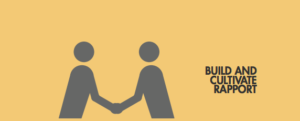There is a reason that “Build and cultivate rapport” is one of the core beliefs of DePaul University’s Center for Writing-based Learning (UCWbL); it’s an integral way in which we, as tutors, connect with writers and establish a working relationship. I have found that there are many parallels between the work which lawyers do and the work that tutors do.
In a courtroom, lawyers must build rapport with everyone from the jury to witnesses in order to best do their job. Larry Johnson, a lawyer, suggests that “if you can make a witness your friend, you have a leg up.” This directly relates to the optimal tutor/writer relationship. In my experience, comfortable writers are more open to suggestion and willing to be honest about they want to improve upon.
What Building Rapport Looks Like
One key way which we can build rapport with our writers is to “[construct] and in-group including [yourself] and the jury,” (Hobbs). This quote from Pamela Hobbs, a Detroit based lawyer, who suggests creating a shared identity with the jury in order to build rapport. Creating a shared identity with your writer can help remove the evaluator/student relationship and instead suggest a peer to peer dynamic. Though as tutors we’re allotted a few minutes in the beginning of our appointment to build rapport, it is something we should continue to build throughout any appointment. In an article written by psychologist Ann T. Greely and Lawyer Lindsay Eriksson, they recommend “Act like you’ve been there before” and definitely “make eye contact.” These are simple habits we can adopt as tutors in order to strengthen our rapport with our writers.
In an ideal scenario, every student who came to the Writing Center would match our enthusiasm for writing and the peer tutoring process. Unfortunately, this is not the case and we sometimes work with hesitant, if not adversarial, writers. We can’t always change a writer’s attitude but in a study conducted by a group at a university in Israel, researchers found that “ratings of rapport exhibited by one partner were positively correlated with the sense of rapport experienced by the other partner,” (Bronstein et al.) Essentially, attempted efforts at creating rapport are typically apparent to the other party.
As tutors, it is our responsibility to work to build rapport no matter how hesitant the writer. Johnson explains that “most witnesses have justifiable anxieties about being deposed and resent the fear caused by [it].” In a similar way, many writers are nervous to share their writing with someone they perceive as an advanced writer. Rapport building with a more hesitant writer is a key way to change a writer’s attitude, both about their experience in the Writing Center, but also about the writing process in general. This makes it an integral part of any session at the UCWbL and beyond to any peer to peer collaboration.
Discover more from UCWbLing
Subscribe to get the latest posts sent to your email.

